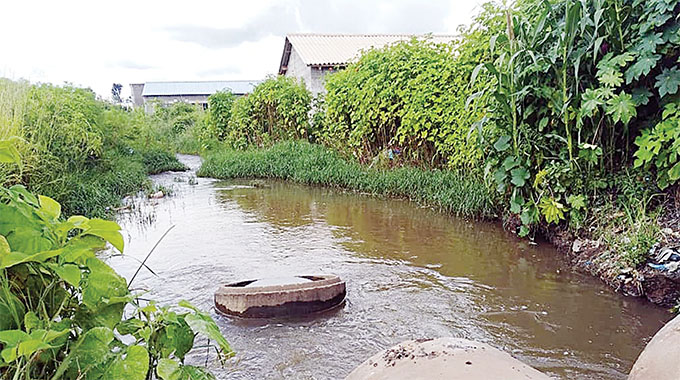Lower Gweru farmers pin hopes on wetlands amid climate change effects

Michael Magoronga, Midlands Correspondent
THE global changes in climate are no longer a distant tale or a far-fetched story that people hear and think does not concern them.
These changes have knocked on the country’s doorstep and communities already have testimonies of their grim effects.
And now, whenever climate change is discussed, people pay attention, they have a connection. It now makes sense.
The country has come face-to-face with climate change following the disruption of the usual rainfall pattern in the 2021-22 farming season leaving many of the country’s farming population staring drought in the face.
With the country reeling under the effects of climate change, Midlands Province has not been spared. Almost half of its crop is a writeoff and the two words that have become part of the climate change catch phrases are mitigation and adaptation.
Midlands provincial crop and livestock officer Mrs Medline Magwenzi said about 50 percent of the rain-fed crop in the province has been declared a write-off due to the prolonged dry spell.
Most farmers have been shifting focus to irrigation systems after losing hope that the rains will return, but the majority cannot afford the cost of irrigation equipment and water bodies are either too far or unavailable.
The rains which pounded most parts of the country last week have been described as a case of “too little too late”, as the damage has already been done.
Deputy director for climate change in the Ministry of Environment, Climate, Tourism and Hospitality Industry Mr Kudzai Ndidzano said such weather phenomenon as is obtaining in most parts of the country is widely associated with climate change, which had altered the onset and cessation of the rainfall season, as well as the occurrence of mid-season dry spells.
“All these factors affect planning for the agricultural season, especially for the farmers who solely rely on rain-fed crop production systems.
This calls for farmers to be proactive and adopt recommended agricultural practices that harvest rainwater and conserve soil moisture like mulching, adopting traditional grains and minimum tillage as practiced through Pfumvudza/Intwasa,” said Mr Ndidzano.
On the other hand, players in the insurance sector have been toying around with an idea of introducing weather-based index and agro-insurance policies to cushion the farmers in case of any eventuality.
But amid all the fumbling and scrounging for a way forward, some communities have made use of natural resources that are usually overlooked by many and taken for granted in other communities.
Dufuya residents in Lower Gweru under Chief Sogwala and some in Zhombe under Chief Ntabeni in the Midlands Province have pinned their hopes on the availability of wetlands in the area and they have started making full use of them.
The Dufuya wetland story is an interesting one where elders of the community say the wetland was discovered in 1958 after a wild animal dug a hole in search of plant roots. Consequently, the hole got filled with water from underground.
Villagers then secured the resultant well by fencing it so that they could access water which began to flow, prompting villagers to fence off a bigger area to get more water.
The fenced off area never dried up hence community members had access to drinking water, cutting short the distance they used to travel to access clean water from Vungu River.
And now about 350 families from the community are pinning their hopes on the wetland which now has about 20 hectares of land for farming, horticulture and livestock.
Tendeukayi Sibanda, the vice-chairperson of Dufuya wetland committee, highlighted that the wetland plays a pivotal role in the supply of freshwater, adding that they were watering a 20-hectare garden using the water drawn from the wetland.
“This has become our source of food since most of our crops were destroyed as a result of the dry spell. We are now pinning our hopes on gardening with water drawn from our wetland since most of us cannot afford irrigation systems,” she said.
Sibanda also urged other communities to preserve wetlands saying they were a source of life.
Water from the wetland is also used to fill a diptank in the community’s fight against tick-borne diseases.
Across the road in Zhombe, about 74 families are also benefiting from a wetland that was discovered in an almost similar fashion.
Mr Daniel Moyo, a community member from Ntabeni Village, highlighted that villagers started benefiting from Madigane Wetland in the late 1940s.
The wetland started off as a small well that was used as a water source by wild animals.
“Community members who used to follow animal tracks then discovered the well and later settled in the area after discovering that there was plenty of water.
The first inhabitants of the area brought their families and the settlement around the wetland grew with time.
Initially there was only one garden near the wetland,” narrated Mr Moyo.
As the population grew, more gardens were pegged with the help of Agritex extension officers.
The wetland was also fenced off to protect it from degradation.
At the moment, the wetland is benefiting 74 families from the community who are growing various vegetables and maize to supplement their diet.
Traditional leaders like Lower Gweru’s Chief Sogwala have been calling on their subjects to guard such places as wetlands jealously.
“People should guard wetlands jealously as they are supporting livelihoods.
Crops grown in wetlands go a long way in contributing towards nutrition and food security, especially in areas where dryland farming is not productive.
As you can see, our crops have dried up after rains disappeared and we now pin our hopes on the wetlands,” he said.
Environment Management Agency (Ema) Midlands provincial spokesperson, Mr Oswald Ndlovu encouraged stakeholders to incorporate wetland protection strategies in their development programmes.
“All relevant institutions should develop and implement plans for the protection and restoration of degraded wetlands.
It is also the responsibility of every citizen to manage wetlands sustainably.
Let us value wetlands, for they provide for human well-being and a balance in the natural ecosystem,” said Mr Ndlovu.
Environment experts, however, lament the continued developments on wetlands saying it is due to legislative loopholes, administrative deficiencies within local authorities and lack of proper collaboration between the ministries and Ema that there is unregulated development on wetlands.
Despite the problems, Zimbabwe has made huge strides to enhance the effective management of wetlands.
Recently, Vice-President Constantino Chiwenga launched the National Wetlands Policy and Wetlands Management Guidelines which among other things will give direction and impetus to the ongoing drive to restore wetlands countrywide.
The National Wetlands Policy will guide the nationwide drive to restore and preserve wetlands by all citizens while the Wetlands Management Guidelines will prescribe what local authorities need to do to preserve wetlands.
— @michaelmagoron1








Comments